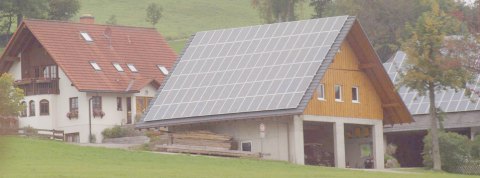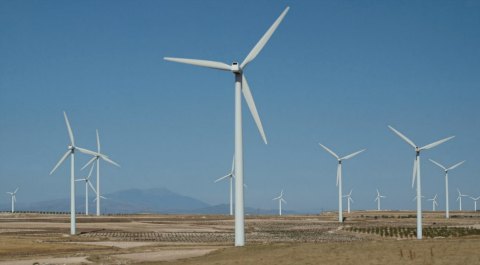Home | About CCW | Contact Us | Climate change Meaning | Causes | Solutions | Emissions | Carbon trading
Emissions reduction
Emissions reduction is the main climate change mitigation activity — it is what we think we can do to slow down climate change and decrease the magnitude of any climate change effect .
The IPCC reports that collate the climate science, including everything from simple observations to complex models, suggest that greenhouse gas emissions are responsible for most of the current global warming.
So many governments have chosen to implement emission reduction policy because the consensus is that greenhouse gas emissions are the key driver of climate change [or at least a driver that we have the capacity to control].

And this makes sense.
Each day we burn huge volumes of oil, gas and coal, to release energy stored from the sun in these carbon rich material. CO2 is released as a by-product. In an instant we send back to the atmosphere a carbon legacy laid down over millions of years.
In 2007 the global emission of CO2 from foosil fuel burning was 32,082 million tCO2e
With more CO2 in the atmosphere, we get a more efficient greenhouse and a warming climate.
So to combat this climate change the objective has become emissions reduction — ways to lower the amount of CO2 we release.
How much reduction?
The problem is to decide how much reduction is necessary? And who should do it?
In order to have something to compare reductions against, the UNFCCC opted to set CO2 emissions in 1990 as the benchmark.
The political and economic arguments have been about how much emissions reduction - to return or go below the 1990 benchmark - how it can be done, and how fast.
The science suggests that getting back to the 1990 numbers will at least slow the amount of warming and limit the effects.
Reduction vs growth
Economic activity around the world has grown by around 4% each year since the 1960s.
For the most part this is considered a good thing.
Increases in trade and commerce means more money generated that can flow through economies. More money means employment, the ability to purchase goods and services and, on average, a better lifestyle for the people.
Economic activity is the exchange of goods and services.
Making the goods requires materials and energy.
Delivering the goods and supplying services means moving products and people around. And this also requires energy.
The problem is that the almost all of this energy still comes from the burning of fossil fuels - oil, gas and coal.
We want growth, indeed we say that it is critical, but we need energy to fuel it.
Only, at the moment, that energy generates greenhouse gas emissions.
It is a serious conundrum.
Where to find reductions
Emissions reduction come from
- energy efficiency
- conversion to alternative energy sources
- improved land management
In many cases it is possible to be more energy efficient. Most industries, businesses and even domestic users can save on energy use mostly with little effort.
However, the house in the suburbs and the office block will still need some power.
Efficiency doesn't just happen. It requires incentives because in most countries the cost of profligacy is low relative to incomes and ability to pay.
Energy is mostly cheap.
Even with incentives there is an efficiency limit for most users. We could be prudent and become more energy efficient but it only takes us so far.
Efficiency is good but what has to happen is a shift to alternative sources of energy.
At some point we have to break the fossil fuel dependence. This is going to happen anyway as reserves of coal, gas and oil are finite. There is only so much we can dig or drill for and safely extract. Climate issues should just make the inevitable more expedient.
How to achieve emission reductions
The climate change wisdom on
Energy conservation
Alternative fuels
Green power
explores options to achieve emission reductions from energy conservation and the shift to alternative sources of energy.
Alternatives are not at a sufficient scale to make this a real choice. The technologies exist but not the capacity.
It is worth remembering that the shift to alternative, carbon clean, energy sources is a key objective for the carbon market mechanisms.
So far though, fossil fuels remain the energy source of choice because they provide enough capacity, are still cheap and remain the most reliable.

Emissions reduction |the real reason we should
Emission reduction has become the main plank of climate change policy around the world. Except that staving off future climate change might not be the real reason we should do it.
Emissions reduction, or more strictly activities that result in fewer greenhouse gas emissions from human activities, is the policy of choice to cope with climate change.
The idea is that because it is greenhouse gases that trap in the atmosphere long wavelength energy that has bounced off the earth's surface, if we slow production of these gases it should limit human induced global warming.
Emission reduction is a preventative measure, a way to reduce what we believe is the cause of our current warming phase of climate change. This might help in not making the problem worse but it cannot do anything about the greenhouse gases already emitted [save a small amount we might claw back through carbon sequestration]. It also does nothing to help us cope with climate change already locked in.
It is, of course, an engineering solution that pampers to our “we can fix it” view of everything.
And we like that. It helps us feel like we are in control.
The problem is that our economies have been built on the energy stored in fossil fuels. When this energy is released to power our vehicles, buildings and mobile devices [yes, in many countries electricity still comes from coal] so greenhouse gases are emitted. And when economic activity goes up, so do emissions.
Immediately we set up conflict between those who want to see the climate change solution delivered by emission reduction and those who want to see economic growth. You can’t have both unless economies transition to energy sources that do not emit greenhouse gases, the so-called clean energy solutions.
And this is the real reason for emissions reduction, to help push economies towards and then through the transition away from fossil fuels. Not because there is any benefit to tackling climate change but because fossil fuels will either run out or security of supply will be compromised beyond the limits of economic tolerance. Eventually we will have to use less fossil fuel so we need to start getting used to it now. Emission reduction for climate mitigation is just a handy bonus.
We are not allowed to mention this reason. Perhaps this is because political leaders feel we are not able to cope with what it means — that our economies are far more fragile than we think. Or perhaps it is the fuel and energy corporations who want it kept quiet. They want to control the transition for maximum profit [much money will be made as fossil fuels become scarce and less will be made if the transition to alternatives is swift].
Emission reduction will happen.
There will be a transition to alternative energy sources that will either be forced upon us or as a result of a managed transition. Either way it will not be because of climate change mitigation.
Do you have a climate change solution?
Do you have a great climate change or environmental solution?
Why not share it?
Back to top of Emissions reduction | Back to Solutions for global warming | Back to Climate-change-wisdom home page
Recent Articles
-
Reducing emissions while looking for solutions...
Nov 01, 15 04:46 PM
I've seen a lot of post's online for ideas on reducing emissions. The one suggestion I have not seen, is the most obvious. There should be a government -
Climate change evidence
Mar 24, 15 06:22 AM
Real climate change evidence has to demonstrate a change in climate. An extra sunny day or a severe storm or a flood is not enough. -
The climate change effect
Feb 19, 15 03:08 AM
What will be the climate change effect? There isn't one, there are many. Perhaps too many for us to understand.

New! Comments
Have your say about what you just read! Leave me a comment in the box below.